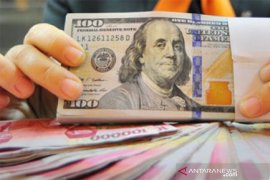BI will continue to monitor developments in the value of the currency in the market to control its volatility.Jakarta (ANTARA News) - Bank Indonesia (BI), the central bank of the country, said that the weakening of the rupiah as seen of late is only temporary.
"We see now that the rupiah is undervalued. From our perspective, the rupiah is already competitive enough for manufacturing exports and is able to attract foreign tourists to visit Indonesia," Mirza Adityaswara, the deputy governor of BI, stated here on Tuesday.
He added that the value of the rupiah was also influenced by the seasonal payments of dividends and external debts in the third quarter of 2015.
BI will continue to monitor developments in the value of the currency in the market to control its volatility, Adityaswara affirmed.
Referring to the fluctuation in the value of rupiah on Tuesday, the BI executive pointed out that it was a reaction to the decision of the Chinese government to depreciate and widen its currency band.
"The Chinese government decided to reduce capital outflow and increase the competitive edge of yuan to boost exports and protect investors at home."
"Currently, the values of the Japanese, South Korean and European currencies, which are the main competitors of China, depreciated considerably," Adityaswara pointed out.
The Chinese policy has influenced all regional currencies, including the rupiah, and nearly all global currencies are weakening against the greenback.
"The impact of the Chinese policy on the rupiah is not as significant as its impact on the Singapore dollar, the South Korean won, the Taiwan dollar, and the Thai baht," he observed.
Moreover, according to the central banks JISDOR exchange rate, the value of the rupiah against the U. S. dollar on Tuesday weakened marginally to Rp13,541 from Rp13,536.
Furthermore, BI Governor Agus Martowardojo stated that BI will continue to monitor the rupiah exchange rate and will always be ready to intervene if and when necessary to prevent instability in its value.
"BI will always be in the market to maintain the rupiahs value and will be ready to intervene anytime if needed. We can notice it from a reduction in foreign exchange reserves," he explained during a press conference here on Tuesday.
He admitted that the rupiah had depreciated by around 8.5 percent since the end of last year, while it had depreciated below 1 percent on a month-to-date basis.
Its average is relatively better as compared to those of other countries in the region, he remarked.
"On a month-to-date basis, the currencies of Singapore, Malaysia, and other ASEAN countries depreciated by more than 1 percent," he pointed out.
In addition, on a year-to-date basis, the rupiah depreciated by a smaller extent as compared to other currencies in the region and the world, where the values of currencies depreciated by more than 10 or even 15 percent, he noted.
According to Martowardojo, global sentiment was the main factor that contributed to the rupiahs depreciation. It was mostly influenced by the U. S. Federal Reserves statement regarding plans to increase its interest rate.
He added that market perception of the slow economic growth in the country was another factor affecting the rupiahs depreciation.
"In the second semester of 2015, we will record an economic growth of more than 5 percent. We believe this will be good," he affirmed.(*)
Editor: Heru Purwanto
Copyright © ANTARA 2015










